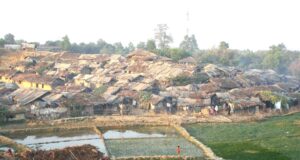I was confused at the giggling but decided to press on with the next question, “Why did you have to fight when you were fourteen?”
Jamal shifted himself in his chair and looked at me straight in the eyes, replying in the most matter of fact fashion possible, “Many [were] dead. Therefore we had to fight.”
“But how would you describe this fighting experience?” I asked naively.
“Only God knows. Hard to describe fighting experience. Heavy fights, sometimes no food and rest for twenty-four hours.”
His response was puzzling to me. People who have experienced conflicts, especially those that involve the loss of loved ones, tend to be emotional in their description of events. Yet here sat Jamal, an exception to what I had expected. Or was I holding onto stereotypical notions of conflict victims that have been played up by the media?
“Tell me what you saw in the very first fight.”
“First time, my uncle, [the] brother of my mother died on the spot.” Jamal made a significant pause, and seemed like he was looking back and attempting to trace his memories.
“One hundred metres away,” rubbing his eyes before folding his arms akimbo. “Can see the bomb from there,” pausing once more. The answers were increasingly short and choppy, interspersed with pauses. It felt as if Jamal was both recollecting his thoughts as well as attempting to control his emotions in these painful and perhaps graphic memories. There was no way a boy of fourteen years of age was likely to forget the explicit images of such a past that cleaved his passage of life into two distinctive junctures. The initial nonchalance was seemingly giving way to traces of emotions.
I was not sure how to respond. While clearly more emotional than earlier, he was still cautious and selective in his recount of events. Just as I was about to probe further, Jamal continued: “it was a 105mm mortar which hit my uncle,” simultaneously gesturing the trajectory of the shell. Almost immediately, Matet and Nicole gasped. One would probably have thought they would have seen everything. Yet their response suggested otherwise. Perhaps Matet and Nicole had never expected such a fate to befall one of their own. The room was not yet done with surprises.
Attempting to probe further, I asked how he had felt when he saw his uncle dying from the mortar shell a mere one hundred metres away.
Jamal dodged the question.
“Our grandfather ordered us to assault the soldiers.”
His blurted response did not really answer my question. I had expected him to describe his emotions then – anger, fear, despair, grief – but there was none. What was more surprising was the reply. It was instantaneous, and seemingly not deliberated. It felt reflexive.
I needed to know more. I wanted to know more.
“Weren’t you sad or afraid when you saw your uncle being killed?”
This response differed from the first. Jamal hesitated. Lifting his hands, he rubbed his mouth, “we need to move on, if not we get bombed. We need to flee.” His replies while considered, were short and sharp. This time, they were laced with a tinge of sadness.
 Human Security Centre Human Rights and International Security Research
Human Security Centre Human Rights and International Security Research




